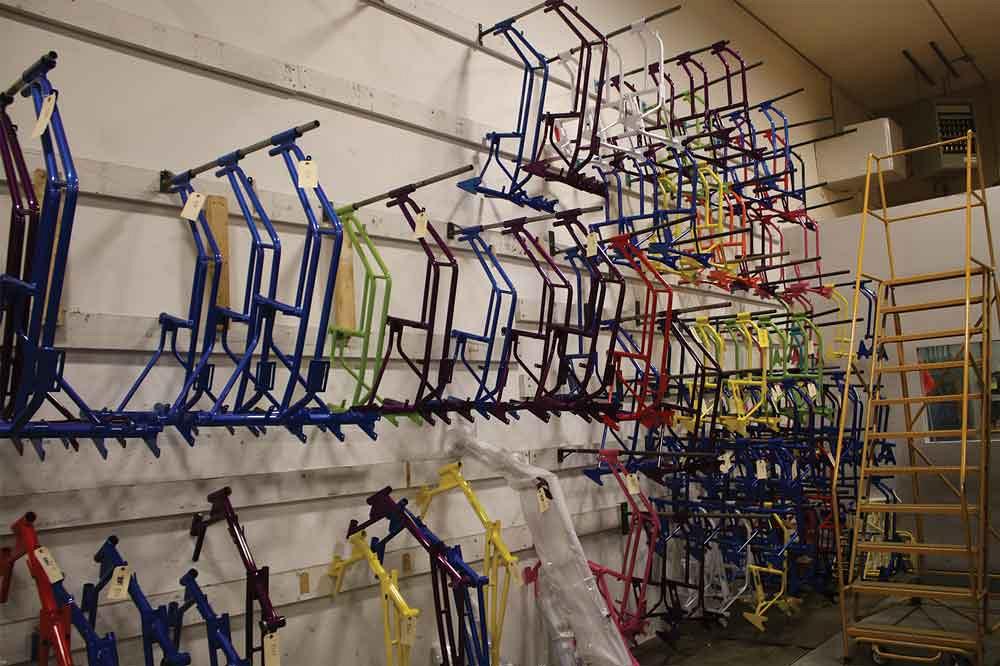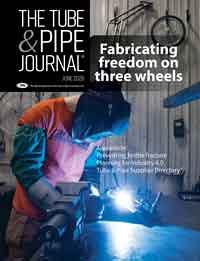- FMA
- The Fabricator
- FABTECH
- Canadian Metalworking
Categories
- Additive Manufacturing
- Aluminum Welding
- Arc Welding
- Assembly and Joining
- Automation and Robotics
- Bending and Forming
- Consumables
- Cutting and Weld Prep
- Electric Vehicles
- En Español
- Finishing
- Hydroforming
- Laser Cutting
- Laser Welding
- Machining
- Manufacturing Software
- Materials Handling
- Metals/Materials
- Oxyfuel Cutting
- Plasma Cutting
- Power Tools
- Punching and Other Holemaking
- Roll Forming
- Safety
- Sawing
- Shearing
- Shop Management
- Testing and Measuring
- Tube and Pipe Fabrication
- Tube and Pipe Production
- Waterjet Cutting
Industry Directory
Webcasts
Podcasts
FAB 40
Advertise
Subscribe
Account Login
Search
Fabricating custom adaptive bicycles that change lives
Specialty bike manufacturer Freedom Concepts provides mobility to riders who need custom rides
- By Eric Lundin
- May 12, 2020
- Article
- Tube and Pipe Fabrication
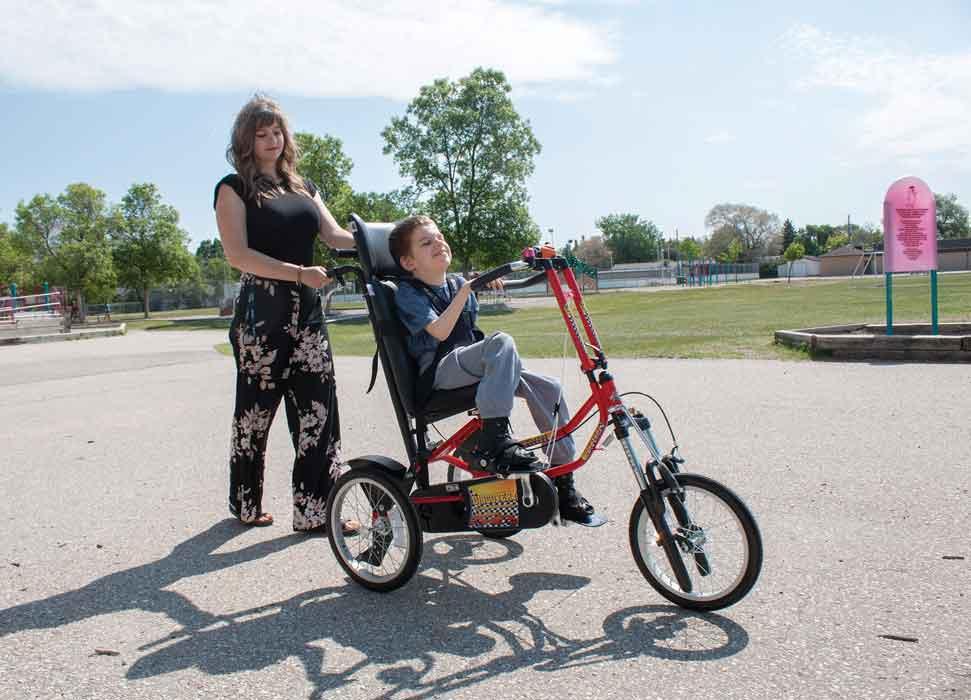
Features and options abound for both rider and parent or caregiver. A low profile helps the rider transfer to and from the cycle and a low center of gravity provides stability. In addition to controls for the rider, many of Freedom Concepts’ adaptive bicycles have handlebars and brake levers at the back for a parent or caregiver to provide some assistance. Guards and shrouds are plentiful, and of course nearly every kid loves to have bells and horns. Images provided by Freedom Concepts Inc.
You might not recall mastering the balance needed to keep a bicycle upright, or the freedom that it entailed, but for most of us, it was probably the first tangible feeling of independence. Tearing through the neighborhood with a gaggle of friends, venturing beyond the end of the block for the first time, escaping parents’ watchful eyes—this was liberation!
Many youngsters aren’t that fortunate. Cerebral palsy, spina bifida, muscular dystrophy, and many other conditions limit coordination, strength, and endurance. Where balance, fine motor skills, strength, and stamina are lacking, so is a sense of freedom. Physical conditions don’t limit ambitions, leaving many yearnings for autonomy unfulfilled.
Enter Freedom Concepts Inc., Winnipeg, Man. The company is an innovator, a metal fabricator, and an OEM hell-bent on smashing such limitations. For 30 years it has been helping these folks by providing product lines of custom adaptive bicycles for riders with special needs.
Humble Beginnings
Like many companies, it started with a single concept. The company’s founder, president, and CEO, Ken Vanstraelen, had already started one fabricating company when he founded Freedom Concepts. Formerly a plumbing and heating systems designer and sales representative, and founder of KV Design Ltd., his first product was North American Rickshaw, a cart for towing children behind bicycles. Because his company was well-versed in fabricating tube for mobility applications, Vanstraelen received a request from a therapist to build a specially outfitted tricycle for a child with cerebral palsy. That was in 1991, and it led to the founding of Freedom Concepts and the products that followed—dozens of standard models and a large number of options that can be added to customize and personalize each rider’s cycle.
“Independence is the big goal,” Vanstraelen said.
Designing for Independence. The first step in independent riding is the ability to get onto and off of a cycle, or transfer as it’s called. For most of us, this means swinging a leg over the saddle and sitting down, but for a rider who doesn’t have as much strength or coordination, nearly every design element of the bicycle must be low in profile to make transfer as easy as possible.
“About 40% of our customers transfer themselves,” Vanstraelen said. The other 60% need some assistance, and some have to transfer from wheelchairs. Some need a boost from a lifting system.
“Some of our riders can’t bear their own weight, but they can ride a tricycle,” he said. The design elements and adjustments for a special-needs rider are much more sophisticated than the simple seat and handlebar adjustments of common bicycles. Open-frame designs, low-profile features, quick-release handlebars that swing out of the way, and custom seats all help. If it sounds like the designers at Freedom Concepts have thought of nearly everything, it’s because they have. They’ve been at this for decades.
What else does Freedom provide? Handlebars on commonly available bicycles and tricycles are shaped like a Y, but that isn’t the only possibility; a rectangular tiller is much more comfortable and easier for some riders. If feet are prone to slipping off the pedals, Freedom uses pedals that are contoured to help hold the feet in place and adds a pair of sturdy loops that ratchet to tighten. Common bicycle seats are actually saddles and aren’t really all that comfortable for any rider. Freedom develops custom seats that are more like chair seats. The bases are wide, backrests are tall, headrests are available, and many incorporate harnesses to help young riders stay snug and upright.
Some riders require very unusual design concepts. For example, the company figured out a way to build a tricycle for a rider who had severely limited limb development. Pedaling and steering with the knees sounds like an impossibility, but the staff at Freedom devised a way to do it.
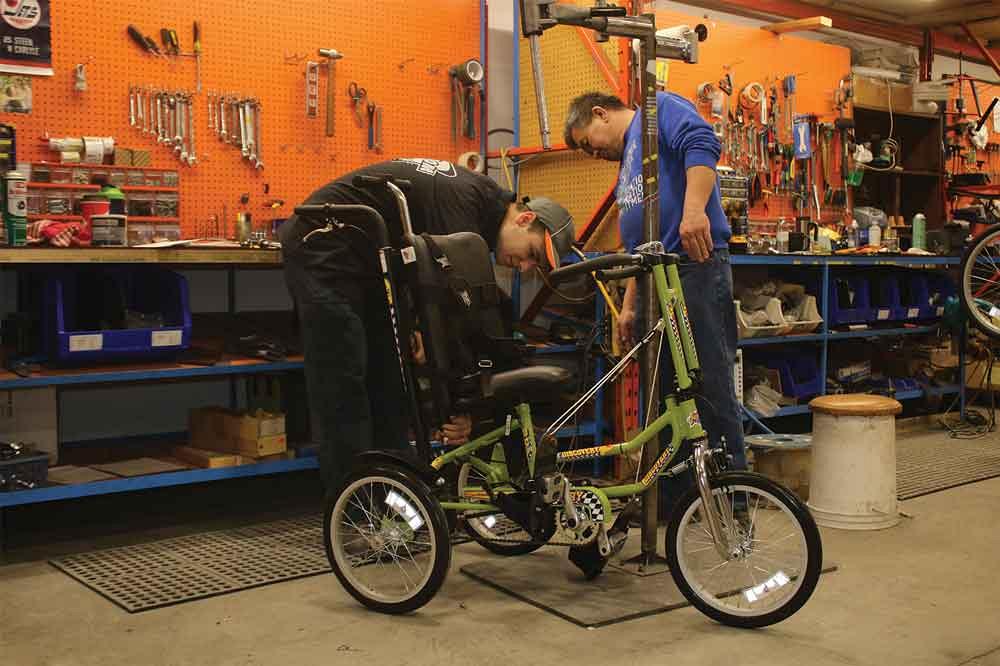
Freedom Concepts’ areas of expertise are many, comprising an understanding of numerous aspects of physiology and anatomy to get the best fit, metal fabrication and welding to build them, and old-school assembly principles to ensure everything affixed to the frame is installed straight and true. Although the design meets the definition of a tricycle, the standard terminology is custom adaptive bicycle.
Limited arm movement? No problem. Freedom offers a knuckle-joint steering system, which multiplies a small lateral handlebar motion into a substantial steering motion. For riders who aren’t ready to steer at all, the company’s proprietary Rear Steer system allows a caregiver to walk along and steer from behind. What happens when the rider develops an interest in steering? No problem. The Rear Steer system can be adjusted to allow the rider to assist, and it can be disengaged entirely if necessary.
Conjoined twins? The company built a cycle for three, equipped with two side-by-side seats in front for the twins and a single seat in the rear for a parent. The sisters pedal independently—yes, the Freedom staff has thought of everything—so if the sisters aren’t quite in sync, they can still enjoy a ride together.
A more common tandem design seats the rider in front and parent or caregiver in back. What happens if the ride is too long and the rider tires out? Simple. The front pedals can be disengaged for a comfortable ride without pedaling.
Some riders need more intensively designed rides than others, but the staff at Freedom doesn’t shy away from challenges.
“We’re always innovating,” Vanstraelen said. “Describe a need and we’ll get to work on a concept.” The company developed 40 or so custom products in 2019 alone.
One of the company’s most extreme designs reversed some of the basic concepts of tricycle design. It has two small wheels in front and one large wheel in back, and the rider leans forward against a front rest. Some designs even have done away with standard pedals and are powered by hand.
Putting Therapeutic Devices Within Reach. All of the adaptive bicycles are custom-made and all are custom-fitted.
“We meet about 70% of our customers in person,” Vanstraelen said. The company’s territory managers work with its physical therapist, Dan Judson, and other physical, occupational, and recreational therapists to evaluate the customer’s needs and determine the proper dimensions for the best posture. For most of us, this concerns the frame size and relative positions of pedals, seat, and handlebars, and little else. For folks with special needs, it becomes much more scientific, including full plantar flexion, proper hip-to-foot position, the appropriate range of motion, and in many cases, a properly sized and fitted backrest and even a headrest.
For the 30% or so of customers who don’t meet a Freedom representative in person, a three-page questionnaire helps to determine the customer’s needs, but that’s just a start. Getting the fit just right still takes an in-depth conversation or two with a parent and a therapist. In such cases, Vanstraelen and his team work as a liaisons among the customer’s physical therapist, the customer, and the company’s designers.
It doesn’t take much more than a passing familiarity with manufacturing and accounting to understand that such tricycles aren’t inexpensive. It’s a niche product in the first place, so the company’s annual volume is low. Each product is custom-fitted, requiring a time commitment for a consultation that most manufactured products simply don’t require. Last is the time needed for assembly. Each work order has a volume of one, making this process the most extreme possible version of high-mix, low-volume manufacturing. The upshot is that custom adaptive bicycles aren’t cheap. At the low end, they run about $2,000, and the most expensive reach $10,000.
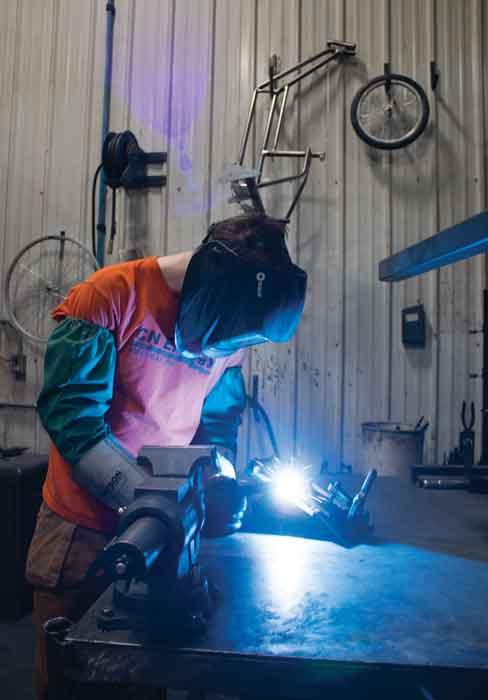
Pedal-powered cycles come in many varieties—road bikes, trail bikes, recumbents, tandems, and so on. Another type, custom adaptive bicycles for folks with special needs, has emerged in recent decades to bring independence and mobility to people who formerly had limitations in both of these areas.
Despite the many benefits such cycles impart—improved muscle tone and balance, bone growth, development of hand-eye coordination, and increased respiratory activity—most insurance carriers regard these as luxuries, so Freedom does what it can to help offset the expense. The sales force helps to pursue grants, and Freedom’s website provides a how-to guide for private fundraising.
Endless Generosity
The shop isn’t outfitted with vast amounts of the latest equipment, but Freedom does use many of the latest manufacturing concepts, such as poka-yoke strategies for error-proofing and cross-training to prevent boredom or burnout. The processes are straightforward, mainly relying on manual tools for cutting and forming—cold saws, notchers, and benders—and a mix of gas metal arc welding and gas tungsten arc welding for assembly.
Still, the company is exploring options in moving up the technology ladder.
“We’re considering purchasing laser-cut tubing from one of our vendors,” said production manager Dirk Hollar. “Engineering our products with tabs and slots will make assembling frames faster and easier, giving us more time to focus on the custom aspects of each trike,” he said.
Hollar has found that vendors are extremely generous when they learn about Freedom Concepts’ mission, which the company summarizes as “creating a cycle of mobility.” Once they learn that children are waiting for these cycles, most put forth some extra effort to do what they can to speed things up. Lead times suddenly get a little shorter, or a lot shorter, and one of its equipment vendors recently offered the company a robotic welding unit.
“We have found that vendors are eager to take on this work, and one of our metals suppliers wants to buy a tube bender to help out,” Hollar said.
To the Finish Line
It wasn’t that long ago that anyone who wasn’t able-bodied was referred to as handicapped or even disabled. The term handicapped still refers to selected parking spaces and perhaps has a few other uses, but thankfully disabled is on the way out. The work at Freedom demonstrates what a poor term this was in the first place. The company doesn’t design a trike to deal with disabilities, but rather capabilities.
For most of Freedom’s customers, no finish line exists. Whether riding for therapy or merely for the joy of riding, every ride means a little more strength, a little more endurance, and little more honing of fine motor skills. Many never stop improving, just as Freedom never stops innovating.
For some of its customers, riding can be a means to an end, especially those who are driven by strong competitive instincts.
“We sponsor some races,” Vanstraelen said. “We built a bicycle for two brothers who competed together in a triathlon. They used a raft for the swimming portion, a jogging device for the running portion, and a tandem bicycle for the cycling portion.”
Freedom’s customer stories all seem to have one thing in common: They’re beyond motivational—they’re downright inspirational.
About the Author

Eric Lundin
2135 Point Blvd
Elgin, IL 60123
815-227-8262
Eric Lundin worked on The Tube & Pipe Journal from 2000 to 2022.
About the Publication
subscribe now
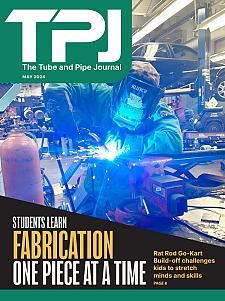
The Tube and Pipe Journal became the first magazine dedicated to serving the metal tube and pipe industry in 1990. Today, it remains the only North American publication devoted to this industry, and it has become the most trusted source of information for tube and pipe professionals.
start your free subscription- Stay connected from anywhere

Easily access valuable industry resources now with full access to the digital edition of The Fabricator.

Easily access valuable industry resources now with full access to the digital edition of The Welder.

Easily access valuable industry resources now with full access to the digital edition of The Tube and Pipe Journal.
- Podcasting
- Podcast:
- The Fabricator Podcast
- Published:
- 04/16/2024
- Running Time:
- 63:29
In this episode of The Fabricator Podcast, Caleb Chamberlain, co-founder and CEO of OSH Cut, discusses his company’s...
- Trending Articles
Zekelman Industries to invest $120 million in Arkansas expansion
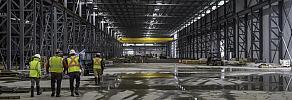
3D laser tube cutting system available in 3, 4, or 5 kW
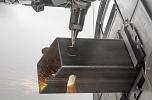
Corrosion-inhibiting coating can be peeled off after use

Brushless copper tubing cutter adjusts to ODs up to 2-1/8 in.
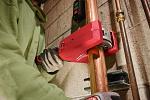
HGG Profiling Equipment names area sales manager

- Industry Events
16th Annual Safety Conference
- April 30 - May 1, 2024
- Elgin,
Pipe and Tube Conference
- May 21 - 22, 2024
- Omaha, NE
World-Class Roll Forming Workshop
- June 5 - 6, 2024
- Louisville, KY
Advanced Laser Application Workshop
- June 25 - 27, 2024
- Novi, MI
























